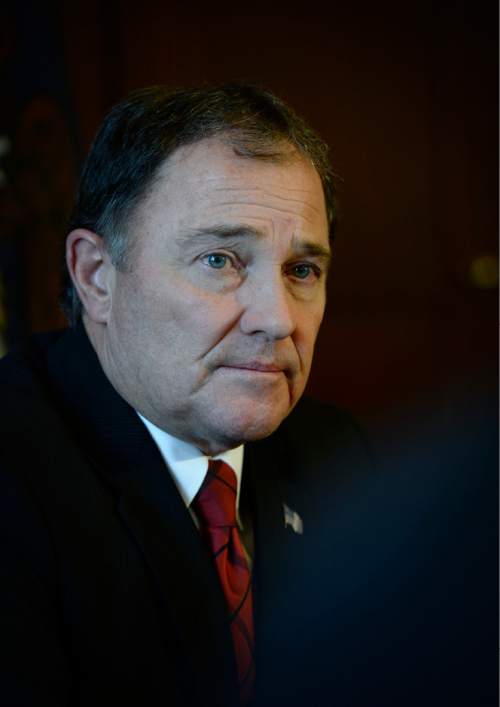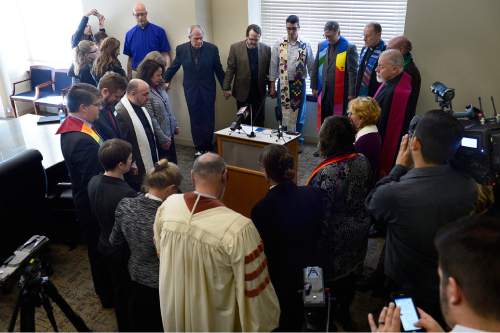This is an archived article that was published on sltrib.com in 2015, and information in the article may be outdated. It is provided only for personal research purposes and may not be reprinted.
A bid to give sweeping protection to religious liberties ''may raise significant constitutional issues,'' and, because it goes further than any other state has, may be susceptible to a court challenge on multiple fronts, according to an analysis by a legislative attorney.
The analysis of Rep. LaVar Christensen's House Bill 322 says the measure could allow — for the first time — people of faith to sue other individuals for imposing on their beliefs, while tipping the scales against the defendant, and could elevate freedom of religion above other constitutionally protected rights.
''The proposed act may be subject to challenge in court because it expands religious protections to an extent not currently recognized by the courts,'' wrote legislative attorney Eric Weeks in the memo obtained by The Tribune. ''Consequently, it is impossible to effectively evaluate its constitutionality or its practical effect on the balance between civil rights and the free exercise of religion.''
Christensen declined to discuss his bill Thursday, one day after it became public, except to issue a statement that religious liberty has been guaranteed since the inception of the state and U.S. constitutions.
''We are working closely and very carefully to make sure that these protections are fairly applied and balanced for the benefit of all,'' he said. The Draper Republican was the sponsor of Utah's 2004 constitutional ban on same-sex marriage that was struck down by federal courts.
Lawmakers are looking for a way to balance religious liberties and protections from employment and housing discrimination for gay, lesbian, bisexual and transgender Utahns, after the LDS Church called for a pairing of the two.
Legislative leaders were not embracing Christensen's bill Thursday, saying it is merely one of several proposals now on the table.
"We'd like something that reflects … the sentiment from the [LDS] church about how we treat everybody with respect and dignity," said House Speaker Greg Hughes, R-Draper. "I believe we have a bill that is beginning a process."
Senate Majority Whip Stuart Adams, R-Layton, who has a bill filed on religious liberties and will be central to the negotiations on the discrimination issue, said Christensen's bill is "well-intentioned," but talks are just beginning.
Senate President Wayne Niederhauser, R-Sandy, wondered if Christensen was inclusive of other viewpoints in drafting his bill.
"My question would be: How involved was the LGBT community in that bill?" he asked.
The memo by the legislative attorney details numerous ways that Christensen's law goes beyond any religious-freedom law in any other state.
For example, while most proposals have only sought to limit government actions that might impair religious liberties, HB322 is unique because it explicitly restricts actions by individuals and private entities that might impact another's religious beliefs.
In essence, Christensen's bill would allow a person of faith to sue another person or business if the religious person contends his or her beliefs have been burdened. And the church-goer would win the suit and be awarded damages unless the defendants could clear an exceptionally high bar — showing that the actions they are accused of taking were the only available to prevent a grave risk to public health and safety.
HB322 would also significantly expand what constitutes a burden on an individual's religious beliefs, in a way that "potentially extends religious freedom protections to arenas of public commerce, property, individual freedoms, and fundamental rights that have not traditionally been subject to religious exercise exemptions in this manner," the analysis said.
By elevating religious protection above other rights, the bill may violate the equal-protection clause of the U.S. Constitution.
Marina Lowe, staff attorney for the American Civil Liberties Union of Utah, said Christensen's bill "goes to a whole different level" than has been seen nationally.
"What it means is, essentially religion is always going to prevail in any suit against discrimination, it's always going to win, even in cases that might affect public safety except in very rare circumstances," she said.
"No one has seen anyone like this before in terms of its breadth," she said.
Leaders from several faiths spoke out against Christensen's bill and in favor of the anti-discrimination law, saying religion should not be used as a justification for discrimination.
"Faith is about love. It's about inclusivity. It's not about being able to discriminate [based] on our belief," said Rabbi Ilana Schwartzman of Congregation Kol Ami. "Our faith tells us we are made in the image of God. It tells us we must behave in godly ways. God loves each of us. It is our obligation to love one another and make space in this Utah community [for all]."
Schwartzman and 18 other church leaders signed a letter to legislators endorsing a law extending housing and employment protections to LGBT Utahns.
"Our personal religious beliefs should not give us the right to fire, evict or deny service to anyone simply because we have an objection to them based on our religious beliefs," the church leaders wrote in a letter to legislators. "Rather our faith compels us to reach out in friendship and love and welcome our gay and transgender neighbors into our community."
Gov. Gary Herbert said he believes the Legislature can strike an appropriate balance between protecting religious liberties and preventing discrimination against LGBT Utahns — and believes the two must be part of a package.
"I would be very disappointed if I had a bill for religious freedom that did not include anti-discrimination and whether that rises to the level of a veto, we would need to see, but I'd be very unhappy," Herbert said.
Twitter: @RobertGehrke





